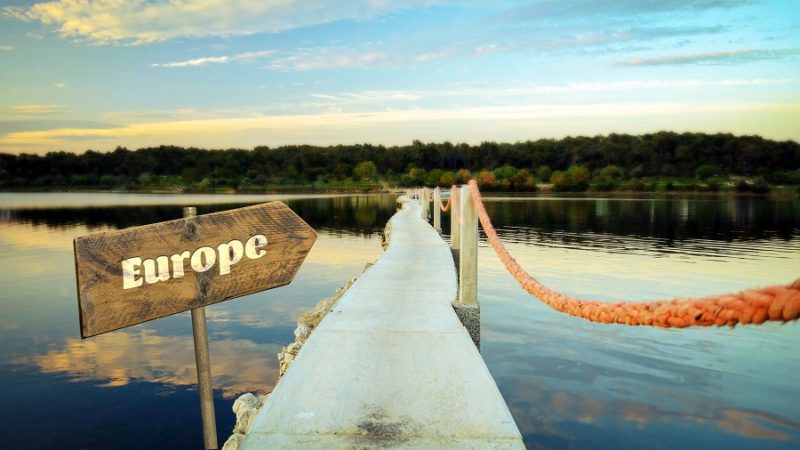
In the run-up to our upcoming Young Professionals Seminar in Zagreb on 12 and 13 March, we publish some articles on the EU and the Western Balkans. This is a text by Karl Luis Neumann, Consultant for EY Forensic and Integrity Services, specialising in Government and Public Sector. He is member of United Europe and one of our Young Professionals Advisors.
The EU integration of the six Western Balkan states of Albania, Bosnia and Herzegovina, Kosovo, Montenegro, North Macedonia and Serbia has been ongoing for 20 years now. None of these states has yet made its way into the European Union. Why is this part of Europe finding it so difficult to overcome the hurdles to EU accession?
Croatia’s EU Presidency offers an opportunity to take a closer look at the region’s integration progress. The accession of the Western Balkan countries to the EU has so far not attracted much European attention. However, there are good reasons to change this.
The turbulent history of the Western Balkans is confused and complicated. It is far from being the only explanation for the slow accession process. However, a look at the past is essential to understand the starting point for EU accession.
The Yugoslav Wars and their aftermath in the 1990s and early 2000s not only caused severe economic damage to the region, but also demanded a great deal of political attention. The fall of the Iron Curtain in the Western Balkans did not trigger a phase of opening and democratisation as in other Eastern European states, but marked the disintegration of the multi-ethnic state of Yugoslavia. The states that we now understand by the term Western Balkans had yet to emerge, while elsewhere in Eastern Europe the Copenhagen Criteria were already being studied.
The wars that accompanied Yugoslavia’s disintegration cut wounds along national borders and ethnic lines that have not yet completely healed. Tense relations in the region are brought to light by the practically ungovernable entity state of Bosnia and Herzegovina, the still not normalized relations between Kosovo and Serbia, or the only recently settled name dispute between North Macedonia and Greece. In combination with an economy weakened by war, this provided a very poor starting point for rapid accession to the EU.
The conflict in Yugoslavia presented the EU with a challenge to which the Community struggled to find a response, if not entirely overburdened by the situation. Only NATO’s military engagement was able to put a stop to the fighting and war crimes, whereas the EU’s intervention policy of sanctions had little effect. Against the backdrop of this impressive demonstration of powerlessness, the opening of a European perspective at the Zagreb Summit in 2000 not only had a lasting peacekeeping function in the region. It also reassured the EU of its influence in its immediate neighbourhood. The shock at the crimes committed in the wars still underlines the EU’s responsibility for stability in its neighbourhood today.
The granting of potential candidate status to all countries in the region in 2003 was a major driver for economic, political and institutional reforms in the following years. The wave of accessions in 2004 and the accession of Romania and Bulgaria in 2007 stimulated the progress of reforms, demonstrating the EU’s clear openness towards enlargement. Until the financial crisis in 2007 and 2008, the region was characterised by rapid economic growth, spurred on by economic opening and political reforms, but also by the reconstruction of the war-battered countries.
The effects of the financial crisis put an end to the drive for growth and clouded the previously optimistic outlook for the Western Balkans. In addition to the immediate economic impact in the region, the crisis made the EU increasingly self-absorbed. The ensuing euro crisis demanded the rest of the EU’s attention, which was now almost entirely focused on its interior. At the same time, the signs that Romania and Bulgaria had joined the EU before its time were apparent. The interplay of these factors led to the EU’s infamous enlargement fatigue, which pushed the accession of the Western Balkan states into the distant future.
Since 2014, the EU has been slowly recovering from its enlargement fatigue signalled by an intensifying exchange between the Western Balkan states and the EU. In 2018 the former head of the Commission, Jean-Claude Juncker, offered the states of Montenegro and Serbia a membership perspective until 2025, thereby determining the first ever time frame for their EU accession.
Regardless of whether accession by 2025 is realistic, the EU is well advised to stick to enlargement in the south-east. On the one hand, the prospect of an enlargement of the Union sends an important signal in times of the Brexit and noticeable anti-European movements in quite a few member states. On the other hand, the integration of the Western Balkans is in the EU’s own best interests. In addition to its geographical location surrounded by EU member states, the region has long been economically and culturally linked to Europe. This proximity to the EU should also be made more tangible politically, otherwise Europe’s dwindling influence will immediately open up the gates for undemocratic actors. China and Russia have been seeking a say in the region for some time.
In recent years, China has been able to buy some influence by investing in strategic infrastructure. These investments, which would have been unaffordable by the states themselves, were facilitated by generous loans from the Far East. In the long term, the region is thus economically dependent on China, which naturally creates political dependencies, too. This becomes drastically clear in the 600,000-inhabitant state of Montenegro, which has taken on massive debts with Chinese donors for the construction of a motorway. The credit drove the national debt from just over 60 percent of gross domestic product to almost 80 percent. Given the doubtful economic viability of the project, it remains more than questionable whether Montenegro will be able to repay this debt burden on time, if at all.
On the other hand, Russia is aggressively courting influence in the Western Balkans. The country has developed a cost-effective strategy to attract public opinion to its side. Serbia serves as a blueprint for the entire region in this respect. The funding of think tanks, operation of news channels aa well as high-profile expressions of affection such as the gift of Soviet fighter jets has led to Russia being perceived as a trustworthy partner and not least as an alternative to the EU. This strategy has ensured that Russia’s presence goes far beyond its actual engagement as both trading and development partner.
However, neither Russia nor China are particularly interested in the long-term development of the region. It is not very likely that two autocratically governed, highly corrupt states have a serious interest in the democratic development of the Western Balkans. Thus, their commitment is not tied to uncomfortable reforms, as EU funds typically are. The illusion that reforms are optional is dangerous for the EU and for the countries concerned. This not only erodes public support for the EU, but also increases the influence of those actors who are not concerned with transformation into open and prosperous democracies, but rather with sheer geopolitical influence. It is quite an unthinkable situation that states join the EU which, due to growing dependencies, would become the Trojan Horse of Russia and China.
The EU Council Presidency of Croatia, the only country in the region to have succeeded in joining the EU so far, is thus an urgently needed opportunity to shift the EU’s focus to the south-eastern part of the continent. During the years of enlargement fatigue, a vacuum was created which was quickly filled by opponents of the EU. It’s time to regain ground.
It is essential to deepen cooperation through openness and commitment on both sides. The majority of societies in the Western Balkans still see the future of their countries in the EU. This patience should not be overstretched. The EU must make credible offers that open up a manageable path to membership. The 2019 veto of the French President Emmanuel Macron to open accession negotiations with Albania was not conducive to such a path. Rather, encouraging reforms while clearly rewarding progress should become the EU’s maxim. Committing to the European future of the region must not only be reflected on the political soapbox but also in active policy implementation.
Moreover, it is not enough to support the development of young democracies in secret. The EU is failing to materialise its importance as a trade and development partner in terms of public perception. Russia, on the other hand, manages to convert its investments into public approval at a much more favourable rate. This is by no means a call for European propaganda à la Sputnik or Russia Today, but rather a call to recognise that the majority support for a European path is by no means God-given. Consequently, the EU must increase the visibility of its commitment.
This year, 20 years after the first rapprochement between the EU and the Western Balkans, the integration of the six Western Balkan countries is more urgent than ever. Croatia, as holder of the EU Presidency, has a crucial role to play in this respect. The country managed to join the EU seven years ago and thus knows the hurdles and challenges involved, but also the advantages of a membership. On the other hand, the Council Presidency offers the necessary platform to draw attention to the EU accession of that region. In the Western Balkans, many more challenges are concentrated in the EU than are thus perceived. The further course of the accession process is decisive for stability in the neighbourhood, the positioning vis-à-vis global players and, not least, the EU’s self-image.



